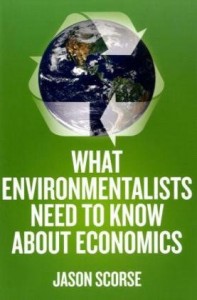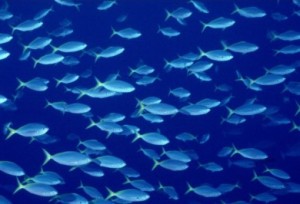This week I took a stab at learning a little about economics and its role in the various environmental issues including global climate change, air pollution and over fishing. “What Environmentalists Need to Know About Economics,” by Jason Scorse, is a book that, using various economic theories, analyzes the three most important sources of environmental problems: market failure, the tragedy of the commons, and the underprovisioning of public goods.
 One of the things that I found interesting was that Scorse explained that one of the first principles of free markets is that for them to work effectively, the full costs of an activity must be borne by the involved parties. For example, many types of air and water pollutants exact a significant price on human health and or degrade ecoysytems, but these costs are not factored in the cost of production or at the consumer level. These costs are known as externalities and these lead to market failure. This is a common argument you hear when people talk about the “true cost of oil.”
One of the things that I found interesting was that Scorse explained that one of the first principles of free markets is that for them to work effectively, the full costs of an activity must be borne by the involved parties. For example, many types of air and water pollutants exact a significant price on human health and or degrade ecoysytems, but these costs are not factored in the cost of production or at the consumer level. These costs are known as externalities and these lead to market failure. This is a common argument you hear when people talk about the “true cost of oil.”
Scorse notes that if we lived in a world where prices fully captured environmental costs, our entire economies would look vastly different. He writes, “…we would have different modes of transportation, different layouts for our cities and towns, different dietary habits, and consumer goods would likely contain much less toxic material. Prices of environmentally harmful goods would rise and much more R&D would go into alternatives, thereby decreasing their price. In such a world society’s resources would be invested in those things which bring the greatest social value.”
In a section of the book, Scorse discusses in detail how two current proposed U.S. environmentally polices would work: cap and trade or an environmental tax. While people are inherently opposed to either scenario, he does a great job explaining how each scenario would work, the pros and cons, and the possible outcomes of each. I should note that cap and trade is already at work in the utility industry so the mechanism is already in place for cap and trade for GHG emissions, or as I like to call it, crap and raid.
From there, he puts some of these economic theories to test on climate change, forest and biodiversity conservation, agriculture, chemical pollution and the fisheries and marine environment. I can’t help but take a moment to point out that in his section on agriculture, he examines ag  subsidies and comes to the “economic” conclusion that they result in huge environmental damage, one of which is the Dead Zone, an area of the ocean that has died off due in part to exorbitant amounts of fertilizers used in farming.
subsidies and comes to the “economic” conclusion that they result in huge environmental damage, one of which is the Dead Zone, an area of the ocean that has died off due in part to exorbitant amounts of fertilizers used in farming.
At the end of the book, he touches on subsides for corn ethanol production. He says that ethanol is a terrible substitute for oil and results in a host of externalities, including increased GHGs. He writes, “This means that the end result of this expensive government program is more environmental degradation, more greenhouse gases, and less incentive for truly “green” energy alternatives, which are at an economic disadvantage since they do not receive subsidies.”
He continues, “For the next decade, the example of ethanol subsidies should be environmentalists’ ‘Exhibit A’ of how not to craft government policy.”
Scorse then goes on to explain why the policy failed and how to avoid a similar situation in the future.
All in all, there are unintended consequences of every action and this book does address how some of them can be factored into the “true cost” of an environmental activity or product. It’s a good place to start learning about economics, but if you really want to delve into the discipline, you’ll need to supplement your library.

